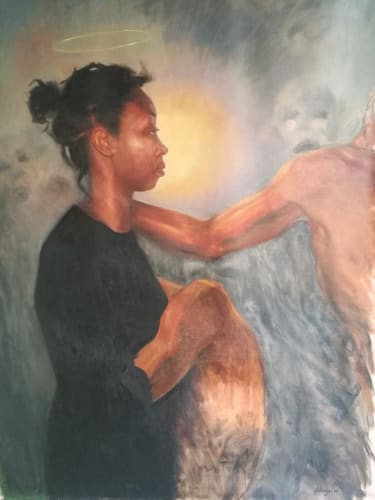Wangui is arguably one of the most talented emerging Kenyan artists, although has largely gone about her work in quiet solitude. An artist from an early age, she spent countless hours in her mother’s kitchen – inspired by available stimulus, varying dramatically from the style musings of Elsa Klench on CNN to the daily lives of the chickens in her yard. These drawings of livestock evolved to the point where she was drafting biological subjects for her biology classes in secondary school. Her fascination with livestock inspired her to study both Zoology and Biochemistry, but her artistic career soon took over while training with Patrick Mukabi at the Go Down Arts Center.
Inspired by the works of expressionist Lucian Freud, and in some ways reminiscent of Gustave Courbet’s “Self Portrait (The Desperate Man),” Wangui’s works are deeply introspective and raw. Heavily textured brushstrokes in our foreground depict characters in trance-like states, balanced against their sub-conscious or historical experiences, creating breathtaking portraits of the characters psychic realities. Each portrait of Wangui’s feels like a full psychoanalytical breakthrough, exposing the undercurrents that both frighten and inspire the character.
While Wangui’s works are in some way inspired by the neo-expressionists, Wangui’s use of symbolism enters the surreal and strikes a departure into her own mélange. Evocative of how both Dali and Andre Breton approached Sigmund Freud’s theories or dreams, desires, and taboos Wangui embraces symbolism to help portray the subconscious. For instance, her use of the egg – it’s representation of both impermanence with no clear beginning and end, as well as it’s contrasting hard exterior/soft interior – is a compelling metaphor of how we build up psychological defenses that are evolving and protect a vulnerable inner psyche.
In many of her works, such as the stunning Yellow Chrysanthemums, Wangui captures the liminality between the power of the ego, with its emphasis on control and shaping of our destiny, and the unknown – showing how we often exist between two states of being. In these uncertain times, where we increasingly feel like Coleridge’s Mariner surrounded by sea with not a drop to drink, it’s helpful to remember the notion of living with grace and surrendering to the unknown.

